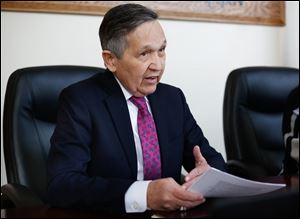
Kucinich calls regional water deal 'grand theft water'
3/8/2018
Democratic gubernatorial candidate Dennis Kucinich meets with the Blade editorial board Thursday. He said a regional water authority is a bad idea for Toledo.
Grand theft water.
That’s what Democratic gubernatorial candidate Dennis Kucinich called the plan to form a Toledo Area Water Authority between Toledo and the eight municipalities that buy its water.
The former Cleveland congressman is wading into the regional water debate as he tours the state on the campaign trail, and on Thursday met with The Blade’s editorial board to outline his opposition to the plan in its current form. He argued that Toledo ratepayers would essentially be paying for the new authority to buy or lease the Collins Park Water Treatment Plant, which Toledo already owns.
“This looks like theft on a massive basis,” he said. “If I were to title this report, I would call it grand theft water.”
Officials from Toledo, Lucas County, Maumee, Perrysburg, Sylvania, Whitehouse, Fulton County, Monroe County, and the Northwestern Water and Sewer District signed a memorandum of understanding in late January that affirmed their desire to move forward with TAWA and outlined how such a system would operate.
That agreement includes language that would allow TAWA to either buy Toledo’s water treatment facility or assume ownership of it after a 30-year lease. What Mr. Kucinich takes most issue with is that either option calls for “common-to-all” payments, according to the MOU.
Mr. Kucinich also questioned why the city signed an agreement that details lease payments before an appraisal determined the value of its treatment plant and other water utility assets.
There are so many unanswered questions, and if these questions aren’t answered to the satisfaction of the people of Toledo, they stand to suffer a massive loss,” he said.
Mr. Kucinich is running against three fellow Democrats — state Sen. Joe Schiavoni (D., Boardman), former federal consumer watchdog Richard Cordray, and former Ohio Supreme Court Justice William O'Neill — to succeed term-limited Republican Gov. John Kasich.
For the Republicans, Attorney General Mike DeWine and Lt. Gov. Mary Taylor also are in the race. The primary election is May 8.
Toledo voters likely will decide in the November election whether their city joins TAWA, provided city council supports forming the authority, thus triggering the need for a referendum.
Eric Rothstein, the consultant hired by the Toledo Regional Chamber of Commerce to facilitate the MOU process, refuted the notion that an asset would be stolen from the city should it join TAWA. He said Toledo plays a dual role in forming the new authority and that the city would gain value from the sale.
“No. 1, they’re selling their asset. No. 2 is, they’re a member of TAWA, and a customer of the TAWA collective. And so as a customer, they would be paying, just like everybody else would be paying, for the lease of the facilities that they’re using,” he said.
Mr. Rothstein, along with city of Toledo employees and city council member Nick Komives, answered two hours worth of questions from the public about the plan for regional water at a community meeting Thursday night.
Citizens said they wanted more details about the lead-pipe replacement and low-income assistance programs that are built into the MOU. They also asked whether the city has an appraised value of its Collins Park Water Treatment Plant, but the majority of the conversation centered on the proposed governance structure of TAWA.
The MOU calls for Toledo to have two voting members on a seven-member board, though five votes would be necessary to approve water rates, issue debt, or acquire additional water facilities. Several citizens asked whether that portion of the TAWA structure could be renegotiated.
“Two out of seven is going to be a problem, I think, in any vote coming up,” said Bob Reinbolt, former city employee.
Mr. Rothstein said the makeup of the TAWA board was agreed to by the leaders of each community that signed the MOU after nearly two years of negotiations. He said that there is always the possibility for those negotiations to be reopened, but only if all parties at the table are willing.
“There was, I think, an explicit effort to try to break from the practices of the past and not worry so much about things like blocking votes, but rather to look toward achieving a governing structure that would promote regional cooperation,” he said.
City council member Gary Johnson said he would be in favor of reopening discussions about the board’s makeup with Toledo’s suburban partners.
“We’ve got to get this right, folks. Regional water, in my opinion, is something that will make this entire economic region better off,” he said. “We need to do something like that, but we certainly can’t walk into this thing putting 60 percent of the money and 60 percent of the usage in and not have a seat at the table.”
He added that he was pleased to see members of the public discussing both the pros and the cons of a regional water deal, and he urged the public to continue to research the issue before a November vote.
The next community meeting about regional water is set for 6 p.m. March 15 at Sanger Branch Library, 3030 W. Central Ave.
Contact Sarah Elms at selms@theblade.com, 419-724-6103, or on Twitter @BySarahElms.